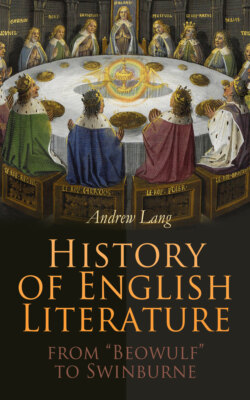Читать книгу History of English Literature from "Beowulf" to Swinburne - Andrew Lang, Robert Kirk - Страница 70
На сайте Литреса книга снята с продажи.
Pecock. "The Repressor."
ОглавлениеA writer of English prose even more interesting, though much less popular and amusing than Mandeville, is Reginald Pecock (1395-1460), the deposed Bishop of Chichester, author of "The Repressor of overmuch blaming of the Clergy". The clergy blamed Pecock, and repressed him. This remarkable man, born shortly before the date of Chaucer's death, in North Wales, was a Fellow of Oriel College, Oxford (1417), was patronized by Humphrey, Duke of Gloucester, obtaining the Mastership of Lord Mayor Whittington's school in London (1431), became Bishop of St. Asaph (1444), and passed his life in attempts to convert the Lollards by persuasion, not by the stake. "The clergy shall be condemned at the last day," he writes, "if by clear wit they draw not men into consent of true faith otherwise than by fire, sword and hangment; although I will not deny these second means to be lawful, provided the former be first used." In the opinion of the Lollards, nothing in ecclesiastical matters was defensible that was not positively inculcated in the Bible as interpreted by the average Christian man, however unlettered. Pecock defended Episcopacy, and even defended non-preaching Bishops, on the score that they had to discharge more important duties. Even the much abused friars he stood up for, arguing that, whatever their offences, they and the world would be worse rather than better if there were no religious orders. His arguments in support of the begging Franciscans who, in counting up money, touched it with a stick, not with the hand, are certainly even more sophistical than ingenious.
He wrote many pamphlets still in manuscript; the "Repressor" is of 1455, and is a most remarkable book in all ways. Pecock became vastly unpopular, because he was too clever, and, in his dislike of religious persecution, as well as in the nature of his arguments, was in advance, not only of his own age, but of the age of the Reformation. He was thought to give far too high authority to reason, and to the natural faculties of man in the way of developing unrevealed morality and unrevealed religion. "No virtue or governance or truth into which the judgment of man's reason may sufficiently ascend or come to, to find, learn, and know it without revelation from God, is grounded on Holy Scripture."
This conclusion arrives at the end of a sentence of thirty lines, a fair example of Pecock's logical and legal style, by him first used in English. It is not possible, here, to discuss Pecock's ideas, which are concerned with questions that still divide the Church and the world, Anglicans, Catholics, Nonconformists, and Agnostics. The "Repressor" has been described as "the earliest piece of good philosophical disquisition of which our English prose literature can boast"; it may still be read with interest, especially by students of the Reformation. Pecock was opposed to the unjust and brutal war of conquest and of disaster waged by England in France.
In 1450 he became Bishop of Chichester, and shared the unpopularity of the Duke of Suffolk, who was blamed for the disasters in France. His "Book of Faith" (1456) practically abandoned the infallibility of the Church in 1457; he was as unpopular with the clergy as with the mob; twenty-four doctors reported unfavourably on his works: he was a defender of "drowsy reason" and of "unrevealed morality": he was found guilty of heresies which were no heresies, and, with no choice except that of being burned alive, he signed a confession and abjuration of sins which he had not committed: he was consigned to close confinement in the Abbey of Thorney, was deprived of his bishopric—and of writing materials—and died obscurely.
The source of his misfortunes was this: he was not only clever but he knew it, and wrote that whatsoever man did not agree with an argument of his "is duller than any man ought to be". As few agreed, most were dull, and they did not like to be told it.
